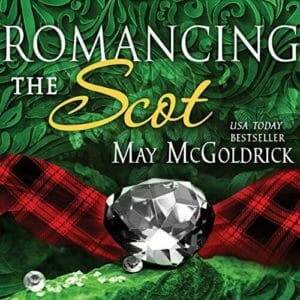 Narrated by Saskia Maarleveld
Narrated by Saskia Maarleveld
Romancing the Scot is the first book in writing duo May McGoldrick’s series of Regency-era novels about the Pennington siblings. In this story, Hugh – Viscount Greysteil – a decorated former army officer and widower of eight years, meets his match in the form of a mysterious young woman who arrives unexpectedly and in a most unusual manner at his estate of Baronsford near the Scottish border.
Ms. McGoldrick provides an interesting historical backdrop to her tale and in Hugh, has created a progressive, forward thinking hero whose position as a Lord Justice of the Scottish Courts gives him ample opportunity to observe the inequalities and injustices faced by so many of the underprivileged around him. He takes his responsibilities – to his estates and in upholding the law – very seriously and does his utmost to help those in need and to ensure that justice is well-served.
Grace Ware is the daughter of an Irish Colonel who fought for Napoléon against the English. Ware suffered a serious injury at Waterloo, but refused treatment and now, a couple of years later, Grace knows that infection has spread throughout his body, and he is dying. An only child, Grace has followed the drum with the father since the death of her mother (a Jacobite sympathiser), her eidetic memory proving a huge asset to the Colonel in his strategising and intelligence gathering. He and Grace are carrying messages from Joseph Bonaparte (exiled in America) to his wife, Princess Julie, and have arrived in Antwerp where they are resting before resuming their journey. Grace is very concerned about the state of her father’s health – he is growing weaker by the day – but he refuses to abandon their plans. Grace’s world is suddenly up-ended when she returns to their rooms to discover them in the process of being ransacked and her father dead, murdered by the intruders. Terrified, she flees to the harbour where she evades her pursuers by hiding in a large crate, intending to wait until they have passed by. Unfortunately, however, the crate is sealed before she can get out, and is lowered aboard a ship.
The crate is bound for Baronsford, where Hugh Pennington – a keen amateur balloonist – eagerly awaits delivery of his new gondola (basket). Shocked to find a young woman close to death within, he immediately carries Grace to the house and arranges for her to be tended by his sister, Josephine (Jo) and the local doctor.
When Grace regains consciousness and begins to recover, she knows she has to decide what to do in the wake of her father’s death. Being the daughter and confidante of an enemy combatant makes her a traitor to the English Crown, and no matter how much she likes Hugh and Jo and is coming to trust them, she is wary of telling them the truth and of creating trouble for them if they are found to be harbouring the daughter of people considered to be traitors. To avoid answering awkward questions, Grace pretends to have no memory of her identity or her past while she considers her options. Things are complicated further, however, by her growing fondness for Hugh; he’s handsome, kind, compassionate and protective, and Grace has never before felt such an overwhelming attraction towards a man. But how can she tell him – a veteran of the war, yet her father’s sworn enemy; a man who could not be with his wife and son in their last moments because he was unable to break through the enemy lines held by her father – the truth of her identity and watch the light and warmth in his eyes die? And while Hugh senses Grace is hiding something from him, he is equally drawn towards her, the first woman in whom he has been seriously interested since the death of his wife.
The story starts strongly, introducing us to Grace – who is, incidentally, the only HR heroine I think I’ve come across who is on the “other side” during the Napoleonic Wars – and then following her as she flees her father’s attackers and then to her dramatic arrival in Scotland. The fast pacing and structure draws the listener in as Grace’s situation becomes dire and we need to know what happens to her. But after this, things slow down and the relationship between Hugh and Grace takes centre stage as they start to dance around their attraction to each other and gradually fall in love. Normally, I’d be all for this sort of focus – I often lament the lack of organic development in romances, and appreciate it when an author takes the time to develop that side of the story. But the middle section of this book is stodgy and I couldn’t get invested in the romance between Grace and Hugh because I just wasn’t feeling that spark between them. They’re both attractive, decent characters (notwithstanding Grace’s deception, which is, at least, undertaken for a good reason), they are intellectually compatible, passionate about justice and about helping those that most need it, but the chemistry between them is not strong, and I need to experience that sense of connection and feel the sexual tension between the protagonists in a romance if I’m to get really caught up in it.
Things do pick up again around three-quarters of the way through when, with a full pardon and a life together at stake, Grace and Hugh must work together to find out what the thieves were looking for in Antwerp – and then decide exactly whom they can trust with the truth.
I have to admit that there were times – especially in the middle part of the story – when I found myself more engaged by Saskia Maarleveld’s expert narration than by the story. She’s one of my go-to narrators for romance and I always enjoy listening to her intelligent and accomplished performances. Here, the characters are all clearly differentiated, and I continue to be impressed by her portrayal of the male characters in any given story, her naturally mezzo-range voice lending itself very well to sustaining a lower pitch that never sounds strained or forced. Here, she also gets to employ a variety of Scottish and Irish accents – Scottish for Hugh, Jo and various of the estate’s servants, and Irish for Grace; in both cases, the accents are, for the most part, accurate and consistently applied, and Ms. Maarleveld does a good job of switching seamlessly between them. Overall, she delivers a well-paced, subtly nuanced and expressive performance, and while I wasn’t wowed by this particular story, she is someone whose name on an audiobook will always make me take a second look, regardless of genre.
Romancing the Scot was a pleasant listen albeit not a compelling one. The book is well written, the central characters are engaging, and I enjoyed the strong historical background to the story, but the romance is somewhat tepid, and the pacing flags in the middle section. It gets a cautious recommendation overall.
Caz
Buy Romancing the Scot by May McGoldrick on Amazon



